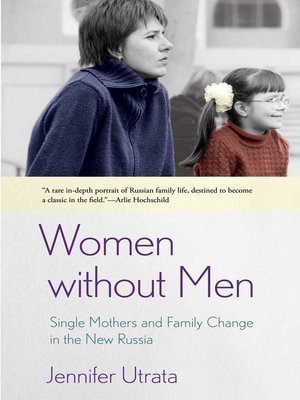
Sign up to save your library
With an OverDrive account, you can save your favorite libraries for at-a-glance information about availability. Find out more about OverDrive accounts.
Find this title in Libby, the library reading app by OverDrive.



Search for a digital library with this title
Title found at these libraries:
| Library Name | Distance |
|---|---|
| Loading... |
Women without Men illuminates Russia's "quiet revolution" in family life through the lens of single motherhood. Drawing on extensive ethnographic and interview data, Jennifer Utrata focuses on the puzzle of how single motherhood—frequently seen as a social problem in other contexts—became taken for granted in the New Russia. While most Russians, including single mothers, believe that two-parent families are preferable, many also contend that single motherhood is an inevitable by-product of two intractable problems: "weak men" (reflected, they argue, in the country's widespread, chronic male alcoholism) and a "weak state" (considered so because of Russia's unequal economy and poor social services). Among the daily struggles to get by and get ahead, single motherhood, Utrata finds, is seldom considered a tragedy.
Utrata begins by tracing the history of the cultural category of "single mother," from the state policies that created this category after World War II, through the demographic trends that contributed to rising rates of single motherhood, to the contemporary tension between the cultural ideal of the two-parent family and the de facto predominance of the matrifocal family. Providing a vivid narrative of the experiences not only of single mothers themselves but also of the grandmothers, other family members, and nonresident fathers who play roles in their lives, Women without Men maps the Russian family against the country's profound postwar social disruptions and dislocations.







